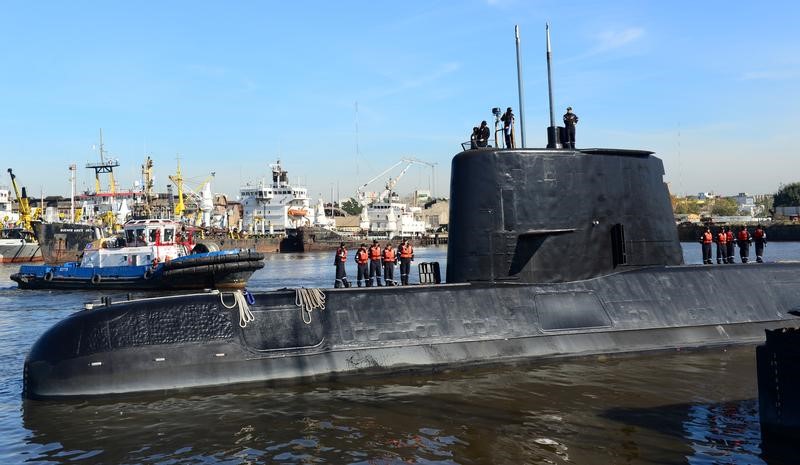Image: The Argentine military submarine ARA San Juan and crew are seen as they leave the port of Buenos Aires, Argentina June 2, 2014. Picture taken on June 2, 2014. Argentine Navy/Handout via REUTERS
![]()
By Jorge Otaola
BUENOS AIRES (Reuters) – Dozens of relatives of the 44 crew members of an Argentine submarine that went missing on November 15 marched from a naval base on Sunday, demanding to know what happened and criticizing the government’s response to the tragedy.
Holding posters with photos of the crew and chanting “Search and Rescue!” the family members walked away from a naval base in Mar del Plata, following a press conference during which the navy said the submarine had still not been located.
The disaster has spurred soul searching over the state of the military in Argentina, which now has one of Latin America’s smallest defense budgets in relation to economic size after a series of financial crises.
“Our disagreement is with the government, not with the navy,” said Marcela Moyano, wife of crew member Hernán Rodríguez, during the protest. “Whoever is responsible needs to be held responsible.”
Spokesman Enrique Balbi said on Thursday the navy had abandoned hope of rescuing the crew alive, noting the ARA San Juan had air supplies for a week while 15 days had passed since it last reported its position.
Some family members complained they were not advised before the general public of the end of the rescue mission and have also demanded more contact with President Mauricio Macri in Mar del Plata, where the San Juan was scheduled to end its journey.
While local media have speculated Macri will soon declare a period of national mourning for the submarine crew, he has been silent in recent days.
“He (Macri) needs to be here because this is the priority, there are 44 families behind this situation and someone has to be in charge,” said Marcela Fernández, wife of Alberto Sánchez.
Macri’s defense minister met with families in Mar del Plata on Friday.
Balbi said on Saturday an object that was being reviewed by a Russian unmanned remotely operated vehicle in the South Atlantic had turned out not to be the submarine. The government has pledged to continue the search with foreign assistance.
The navy said on Nov. 27 that water that entered the submarine’s snorkel caused its battery to short-circuit before it went missing. The navy had previously said international organizations detected a noise that could have been the submarine’s implosion the same day contact was lost.
(Reporting by Jorge Otaola and Caroline Stauffer; Editing by Mary Milliken)
Copyright 2017 Thomson Reuters. Click for Restrictions.


